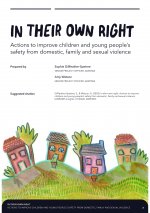
In Their Own Right - Actions to improve children and young people’s safety from domestic, family and sexual violence
Omschrijving
This guide outlines key actions for consistent and effective policy responses for children and young people experiencing violence, who are often overlooked by the systems and services meant to support their safety.
Building a society where children are safe is everyone’s business.
People working to address children and young people’s experiences of violence often know what the problems are but may feel less confident about how to actually address them.
ANROWS has produced over 20 research reports on children and young people’s unique experiences of domestic, family and sexual violence. These reports include over 130 policy and practice recommendations, which cannot be left to gather dust.
This is a guide to the common policy recommendations made across the ANROWS reports. The guide includes four principles that outline ways of working to underpin reform and eight priority areas for action.Policy actors at all levels of the Australian Government, practice leaders and advocates can use it to create and advocate for more consistent and effective policy responses for children and young people.
Key implications
Policy reform must recognise intersecting forms of oppression, use a rights-based approach, have a clear authorising environment, and recognise that where there is violence, there is resistance.
The evidence points to eight priority areas for action, which show we need to:
- Recognise the profound and diverse impacts of domestic, family and sexual violence on children and young people
- Centre the voices, strengths and needs of children and young people
- Prioritise primary prevention centring children and young people’s wellbeing and safety
- Acknowledge and act on Aboriginal and Torres Strait Islander peoples’ knowledge of what is best for their children
- Design and deliver holistic child-centred systems, policies and supports
- Collaborate across systems to respond holistically to children and young people’s needs
- Invest in skill development in trauma- and domestic, family and sexual violence-informed care across systems and services
- Share knowledge across services working with disability; domestic, family and sexual violence; and children and young people.
